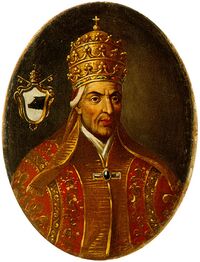1061
| قرن: | قرن 0 - قرن 1 - قرن 2 |
| العقد: | عقد -20 عقد -10 0 - عقد 10 - عقد 20 عقد 30 عقد 40
|
| سنة: | 7 8 9 - 10 - 11 12 13 |
| التحويل من ميلادي إلى هجري |
| تحويل 1-1-1061م الى هجري (وصلة خارجية) |
| تحويل 31-12-1061م الى هجري (وصلة خارجية) |
| ابحث في الموسوعة عن مواضيع متعلقة بسنة 1061 |
تحويل 1-1-1061م الى هجري (وصلة خارجية) | تحويل 31-12-1061م الى هجري (وصلة خارجية) | ابحث في الموسوعة عن مواضيع متعلقة بسنة 1061
| ألفية: | الألفية 2 |
|---|---|
| قرون: | القرن 10 – القرن 11 – القرن 12 |
| عقود: | عقد 1030 عقد 1040 عقد 1050 – عقد 1060 – عقد 1070 عقد 1080 عقد 1090 |
| سنين: | 1058 1059 1060 – 1061 – 1062 1063 1064 |
| 1061 حسب الموضوع | |
| قوائم الزعماء | |
| زعماء الدول | |
| تصنيفا المواليد والوفيات | |
| المواليد – الوفيات | |
| تصنيفا التأسيسات والانحلالات | |
| التأسيسات – الانحلالات | |
| التقويم الگريگوري | 1061 MLXI |
| آب أوربه كونديتا | 1814 |
| التقويم الأرمني | 510 ԹՎ ՇԺ |
| التقويم الآشوري | 5811 |
| التقويم البهائي | −783 – −782 |
| التقويم البنغالي | 468 |
| التقويم الأمازيغي | 2011 |
| سنة العهد الإنگليزي | N/A |
| التقويم البوذي | 1605 |
| التقويم البورمي | 423 |
| التقويم البيزنطي | 6569–6570 |
| التقويم الصيني | 庚子年 (المعدن الفأر) 3757 أو 3697 — إلى — 辛丑年 (المعدن الثور) 3758 أو 3698 |
| التقويم القبطي | 777–778 |
| التقويم الديسكوردي | 2227 |
| التقويم الإثيوپي | 1053–1054 |
| التقويم العبري | 4821–4822 |
| التقاويم الهندوسية | |
| - ڤيكرام سامڤات | 1117–1118 |
| - شاكا سامڤات | 983–984 |
| - كالي يوگا | 4162–4163 |
| تقويم الهولوسين | 11061 |
| تقويم الإگبو | 61–62 |
| التقويم الإيراني | 439–440 |
| التقويم الهجري | 452–453 |
| التقويم الياباني | Kōhei 4 (康平4年) |
| تقويم جوچى | N/A |
| التقويم اليوليوسي | 1061 MLXI |
| التقويم الكوري | 3394 |
| تقويم مينگوو | 851 قبل جمهورية الصين 民前851年 |
| التقويم الشمسي التايلندي | 1604 |
Year 1061 (MLXI) was a common year starting on Monday (link will display the full calendar) of the Julian calendar.
أحداث
حسب المكان
أوروپا
- Spring - Robert de Grandmesnil، his nephew Berengar، half-sister Judith (future wife of Roger I), and eleven monks of the Abbey of Saint-Evroul، are banished by Duke William II (the Bastard) of Normandy for violence, and travel to Southern Italy.[1]
- Summer - Norman forces led by Duke Robert Guiscard and his brother Roger I invade Sicily. They land unseen during the night and surprise the Saracen army. Guiscard conquers Messina and marches into central Sicily.
- June 28 - Count Floris I is ambushed on a retreat from Zaltbommel and killed by German troops at Nederhemert. Most of West Frisia (later part of the County of Holland) is conquered and annexed by the Holy Roman Empire.
- Sosols (a tribe in Estonia) destroy the Kievan Rus' fortification of Yuryev in Tartu، and carry out a raid on Pskov.[2]
أفريقيا
- السلطان يوسف بن تاشفين يعتلي عرش المغرب، following the Almoravid conquest.
حسب الموضوع
الدين
 Pope Alexander II (r. 1061–1073) |
- July 27 - Pope Nicholas II dies after a 2-year pontificate at Florence. He is succeeded by Alexander II as the 156th pope of the Catholic Church in Rome.
- The Speyer Cathedral is consecrated in Speyer (modern Germany).
مواليد
- Al-Maziri، Zirid imam، jurist and scholar (ت. 1141)
- الطغرائي، Persian poet and alchemist (ت. 1121)
- Roger Borsa، duke of Apulia and Calabria (or 1060)
- William II (the German), count of Burgundy (ت. 1125)
- ووياشو، chieftain of the Wanyan tribe (ت. 1113)
وفيات
- January 28 - Spytihněv II، duke of Bohemia (و. 1031)
- May 5 - Humbert of Moyenmoutier، French cardinal
- June 28 - Floris I، count of Friesland (west of the Vlie)
- July 13 - Beatrice I، German abbess of Quedlinburg (و. 1037)
- July 27 - Nicholas II، pope of the Catholic Church
- Abu Sa'id Gardezi، Persian geographer and historian
- Adelmann، bishop of Brescia (approximate date)
- علي بن رضوان، Arab physician and astronomer
- Burgheard، English nobleman
- Burkhard I (or Burchardus), German nobleman
- Conrad III (or Konrad III), German nobleman
- Henry I (or Heinrich I), German count palatine
- Rajaraja Narendra، Indian ruler (و. 1022)
- Rúaidhri Ua Flaithbheartaigh، king of Iar Connacht
- Song Qi، Chinese statesman and historian (و. 998)
المراجع
- ^ John Julius Norwich, The Normans in the South 1016–1130 (London: Solitaire Books, 1981), pp. 146–47.
- ^ Mäesalu, Ain (2012). "Could Kedipiv in East-Slavonic Chronicles be Keava hill fort?" (PDF). Estonian Journal of Archaeology. 1: 199. Archived (PDF) from the original on 2022-10-09. Retrieved 27 December 2016.
This article may include material from Wikimedia licensed under CC BY-SA 4.0. Please comply with the license terms.